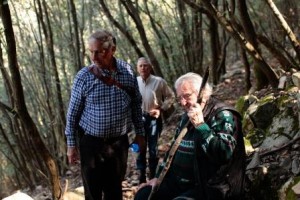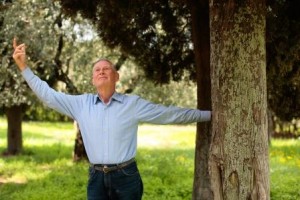so during the movie they were looking for the cave and spending time reminiscing and eating - LOL -
hey it's a film about Jews - of course there is food... they go to the market and buy food, they prepare food, they have a nice dinner in the "fancy" living room on Shabbat - and near the end a huge family meal to conclude their time together.
The oldest of the three brothers is an anthropologist and another is a physicist and the third was either never clear or I didn't catch it... in order of the vocations above- Meme (Emmanuel) - Andrea - and Bubi (whose given name was Reuven - all last name Anati (now).
here is a lovely synopsis of the movie from the website of Bernard Dichek-
http://www.bdichek.com/uncategorized/reflections-from-a-cave/
some editing for clarity -
Emmanuel Anati, 84, is addressing an annual conference of psychoanalysts in Sicily. An eclectic scholar, world-renowned for his expertise in archeology, anthropology and pre-historic art, Anati, for years, has been invited by this elite group to share his observations about various subject matters. This year, the topic is solitude. “My dear colleagues,” begins Anati. He pauses and then continues. “For the first time, I am going to talk to you about something personal.” This brief dramatic moment is included in the epilogue to the new Israeli documentary Shalom Italia (Hebrew version: Three Brothers and a Cave). Emmanuel, in the course of his lecture, will harken back to his childhood in Italy.
He has just completed a journey with his two younger brothers in which the three visited the places where they grew up and hid during the Holocaust – places they had not been to in some 70 years.... an intriguing character study of the three brothers around their late-life road trip that is rich with humor, yet unspoiled by a single maudlin moment. Bubi [Reuven Anati], the youngest of the three brothers, mentioned that he was headed to Italy where he was determined to find the cave where he and his family hid during the Holocaust. His two older brothers, Andrea and Emmanuel, after a bit of convincing, had agreed to go with him. The Anati brothers consented, and a month later the five flew to Rome where they squeezed into a Fiat Panda and drove into the Tuscany countryside.
The brothers had never before traveled together without their wives and children. They also had never tried to find their old family home in Florence or talked very much, among themselves or with anyone else, about what happened to them when they were children. The Anati family, headed by Hugo, a well-established architect, and Elza had lived in Florence for generations. In 1942, as Jews were being rounded up and deported to Auschwitz, Hugo and Elza, two grandmothers and their four sons, including Gabriel who died 20 years ago, fled into the countryside. During the next three years, they moved from one hiding place to another.
The dramatic structure of the film revolves around the attempt of Emmanuel, Andrea and Bubi to locate one hiding place in particular – a cave, high up in the mountains, that was their last safe refuge. They wander around the forest, equipped with nothing more than picnic baskets, examining every possible lead. Where exactly was the cave? What was it like living there? Is it possible that there really wasn’t a cave, after all? It soon becomes clear that whether or not they find the cave is not of paramount importance. “They have become like they were as children again. And, now, despite all of their differences, the brothers can decide if they want to accept each other’s story as it is.”
As they climb, talk, argue, laugh, gaze into the breathtaking Tuscany scenery, and partake of local wines, cheeses, tomatoes and salamis, we begin to get a picture of three very different personalities with three very dissimilar recollections of the past.
Serious-minded Emmanuel, who was 14 years old when the family began its odyssey, is skeptical about many of the stories the others seem to recall. He speaks about the past with a sense of loneliness. Andrea, cheerful in demeanor, 12 at the time, recalls playing Robin Hood with bows and arrows in the woods. “We had fun in the Holocaust,” he says unabashedly. He often is seen trotting up and down the mountainside ahead of the others. Easy-going Bubi, 4 at the time, doesn’t really have too many first-hand memories but draws on stories he has heard from others. He initiated the trip and he is the most curious.
“What really interested me in making this film was exploring the way memories influence our lives,” says Tal (the film maker and a family member). “I tried to focus on what happens when a group of siblings relive their childhood and unravel strands of memories. I wanted to let the viewer be in that moment with them and observe the effect it has on them.” The film doesn’t include on-camera interviews or other didactic documentary techniques; instead, it emphasizes contemplative dialogues, melancholy and humorous sequence and lyrical renditions of landscapes as the brothers slowly come to terms with each other.
Emmanuel, who was forced away from his studies and friends at an early age, has built his career around academic study and seems most at ease wandering around the isolated desert landscape near his home in the Negev. Andrea, the nature child, now in his eighties, continues to be a nature lover, spending his weekends pulling himself up and down mountains with climbing ropes. Bubi, is a bit like both Andrea and Emmanuel. Like Andrea, he is immersed in nature and has built a career designing natural science parks around the world. Like Emmanuel, he was not willing – until now – to face the past, and previously did not attempt to venture near the family home in Florence, even though he spends half the year living in Italy.





No comments:
Post a Comment